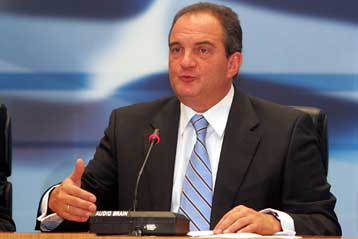 Results showed a clear swing to the "Yes" camp
(BBC) - 3 October 2009 17:38 UK Irish voters have strongly endorsed the European Union's Lisbon Treaty - 16 months after their first vote rejecting it plunged EU reforms into deadlock. About 67% voted "Yes", official results from the latest referendum showed. Irish Prime Minister Brian Cowen hailed a "clear and resounding" endorsement. The EU Commission called it a "vote of confidence" in the EU. Nearly all member states have ratified Lisbon. The treaty is aimed at streamlining decision-making in the 27-nation bloc. According to final results, 67.1% of Irish voters approved it, while 32.9% voted "No". Turnout in the three-million electorate was 58%. The treaty cannot take effect until all member states ratify it. The only other countries yet to ratify Lisbon are the Czech Republic and Poland. The parliaments of both countries have approved the treaty. Polish President Lech Kaczynski is expected to sign it in the coming days. But the Czech Republic's eurosceptic President, Vaclav Klaus, said he would not sign the treaty until his country's Constitutional Court had pronounced on its validity.  | LISBON TREATY Creates new post of EU president (President of European Council) New post of High Representative for Foreign Affairs More decisions by majority vote, rather than unanimity Ratified by all member states except Czech Republic, Ireland and Poland Only Ireland held a referendum on it Took a decade of negotiations Was intended to take effect in January 2009 | Ireland was the only EU member state to hold a referendum on Lisbon, though there have been calls for referendums in several countries. "The Irish people have spoken with a clear and resounding voice," Mr Cowen said in a brief statement to reporters. "It is a good day for Ireland and a good day for Europe." "The Irish people showed an Ireland embracing her future with Europe," he said. The Irish anti-Lisbon group Coir said on Saturday: "We are extremely disappointed that the voice of the people was not heard the first time around." EU hails 'victory' Swedish Foreign Minister Carl Bildt, whose country currently holds the EU presidency, called the vote "an important victory for Ireland and for all of Europe". He said it was just a matter of time until the EU "finally can push the button for the better European co-operation that the Lisbon Treaty will give us". Brian Cowen: "The Irish have supported reforms so the EU can become more efficient and more effective" The European Commission President, Jose Manuel Barroso, praised the Irish "vote of confidence" in the EU, which he said showed a "desire to be a wholehearted member". Irish opinion is thought to have swung behind the "Yes" vote this time because of the severity of the economic downturn, as well as the legal "guarantees" on Irish sovereignty that the EU pledged after the first referendum. The legally binding "guarantees" state that Lisbon will not affect key areas of Irish sovereignty, such as taxation, military neutrality and family matters such as abortion - significant issues in last year's campaign in Ireland. But they have not yet been attached to the treaty. The treaty is intended to make EU institutions better suited to the enlarged bloc of 27. Opponents see Lisbon as part of a federalist agenda that threatens national sovereignty. In last year's vote, 46.6% of Irish voted "Yes" and 53.4% "No", and the rejection of the treaty plunged the EU into political gridlock. All of the republic's major parties campaigned for a "Yes" vote except the nationalist Sinn Fein. The party believes rejecting the treaty would mean a more democratic EU. |  Εν συνεχεία παραιτήθηκε από Πρόεδρος της Νέας Δημοκρατίας μετά από 13 χρόνια στο τιμόνι της και ύστερα από δυο νίκες και αφού πρώτα συγκάλεσε συνέδριο που θα λάβει μέρος σε ένα μήνα , σύμφωνα με το Καταστατικό του Κόμματος, για την ανάδειξη νέου αρχηγού, στο οποίο δεν θα θέση και πάλι ο ίδιος υποψηφιότητα, αλλά θα παραμείνει ως απλός στρατιώτης στην Κοινοβουλευτική ομάδα του Κόμματος....
Εν συνεχεία παραιτήθηκε από Πρόεδρος της Νέας Δημοκρατίας μετά από 13 χρόνια στο τιμόνι της και ύστερα από δυο νίκες και αφού πρώτα συγκάλεσε συνέδριο που θα λάβει μέρος σε ένα μήνα , σύμφωνα με το Καταστατικό του Κόμματος, για την ανάδειξη νέου αρχηγού, στο οποίο δεν θα θέση και πάλι ο ίδιος υποψηφιότητα, αλλά θα παραμείνει ως απλός στρατιώτης στην Κοινοβουλευτική ομάδα του Κόμματος....





